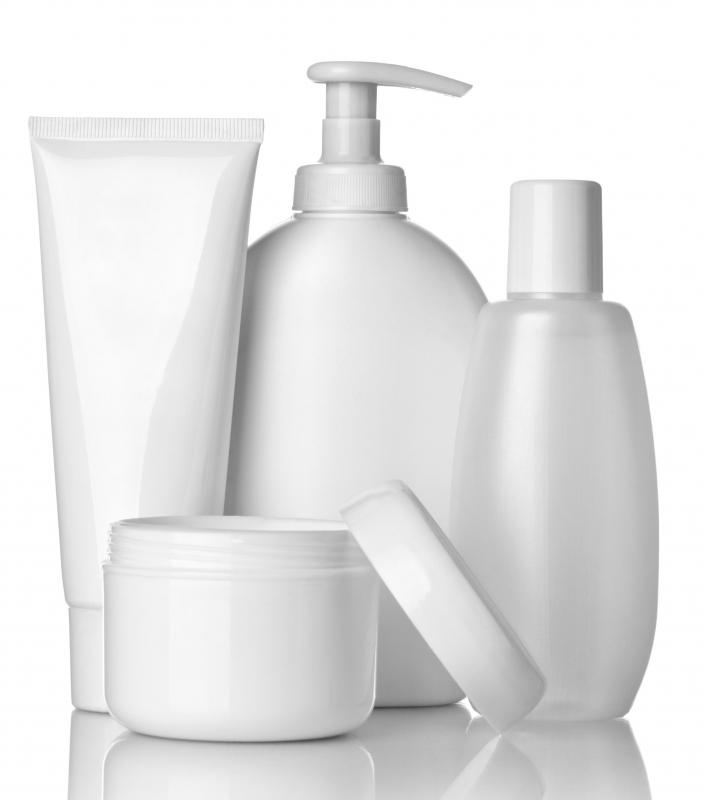At WiseGEEK, we're committed to delivering accurate, trustworthy information. Our expert-authored content is rigorously fact-checked and sourced from credible authorities. Discover how we uphold the highest standards in providing you with reliable knowledge.
How do I Choose the Best Vitamin C Moisturizer?
Choosing the best vitamin C moisturizer is usually a matter of figuring out what your skin needs, then comparing this against the available options. The moisturizer that is best for a friend isn’t necessarily the one you should choose since a lot depends on your age, your skin type and tone, and how you intend to use the product. Vitamin C lotions typically come in either water-soluble or fat-soluble suspensions, and the difference is important. Some moisturizers also combine the vitamin with other oils and minerals to form something of a “cocktail” that can help address specific skin issues more effectively than any one could on its own. Adverse reactions like rashes or allergies are rare, but if you have sensitive skin it might be smart to start with a small amount and test it out for a few days before investing in a full-sized product to be sure your skin will respond well.
Identify Your Skin Type

The very first thing to think about is what sort of skin you have, as this can help you narrow down your search. People with dry, sensitive skin typically need a rich cream that will help the skin cells stay hydrated, while those with oily skin are often better served by a thinner, silkier moisturizer that won’t clog pores or cake too thickly. If you have “mature” skin or have spent a lot of time in the sun you will probably want a lotion that has high concentrations of vitamin C to maximize its anti-aging properties; younger people and children often do better with lower concentrations or vitamin cocktails. So-called “combination” moisturizers usually capture vitamin C’s ability to offer rich hydration but don’t always harness the antioxidant benefits as well. They tend to be a lot less expensive, however.
Think About the Results You Want

People use vitamin C moisturizer for a number of different reasons, and nailing down exactly what your goals are can help you choose the right one. Many creams are targeted at people who are looking to reduce lines and wrinkles, particularly on the face and hands. The vitamin plays a vital role in the formation of collagen, a protein that provides structure to the face by connecting soft tissues with the skeleton. As people age, the production of collagen slows down, resulting in fine lines and wrinkles on the skin. Skin with an insufficient amount of collagen also bruises easily.

It can also be a very effective moisture “boost” for dry skin. Most products catering to this need come as a rich cream high in essential fatty acids, and ingredients like grapeseed oil and avocado oil are common additives. By moisturizing the skin and promoting collagen synthesis, these moisturizers may also brighten and improve the skin's appearance. Vitamin C products are also commonly paired with sunscreens. These are often sold with the promise of repairing sun damage while preventing the same in the future.

The vitamin might also help scars or other skin abrasions fade, or may at least help speed their natural healing. Products with this goal are typically sold as gels or medicated lotions, and often include other ingredients designed to help skin regenerate more quickly than normal. This type of moisturizer might not be sold in the same place as some of the others, though a lot depends on the store. It’s often the case that more “cosmetic” moisturizers are sold with regular lotions and makeup products, while those with a more medicinal purpose are grouped with first aid and wound treatment items.
Understand the Labels

Carefully reading a product's ingredient list is also key to identifying the one that's best for you. If it says "L-ascorbic acid" on the label, it contains the water-soluble form of the vitamin, which means it will probably soak into the skin fairly quickly by absorbing into water-based cells. A moisturizer with hyaluronic acid is similarly likely to be super moisturizing, as this compound increases the formula's penetration past the initial surface of the skin. Hyaluronic acid is especially beneficial for mature or dry skin.
Ascorbyl palmitate, also used in skin care, is a fat-soluble derivative of vitamin C. It is more stable than pure vitamin C and is less likely to irritate the skin. If you have sensitive skin, ascorbyl palmitate may be the best choice, though its effects aren’t typically as long lasting. This isn’t necessarily a bad thing, but often means you’ll have to reapply more often to get good results.
Common Downsides
It’s usually the case that vitamin C molecules are quite unstable, which means that the longer they are exposed to oxygen the less effective they will become — and in some cases, prolonged exposure to air can actually increase the formation of free radicals, which can all but erase its anti-aging properties. If you purchase a moisturizer with vitamin C, check to make sure that the product is in an airtight, sealed package. If you suspect that your moisturizer has oxidized, stop using it.
These sorts of moisturizers are usually good choices for people with sensitive or highly irritable skin, but a lot of this depends on the person as well as any additives that a particular cream or lotion contains. If you’re worried about a bad reaction, it’s usually a good idea to start with a small bottle, or a sample if you can get one, and apply it to only a bit of skin, usually on the arm or leg. It’s a good idea to avoid the sensitive facial area at first. Leave it to rest for 48 hours and, if you don’t have a reaction, it’s probably safe to use anywhere.
AS FEATURED ON:
AS FEATURED ON:















Discussion Comments
This really is a great article. I've been using natural moisturizing oil with vitamin c and vitamin e for years called Beaulee's Bedew. Originally, I started using it for dry skin with Acne breakouts but it really did more for my face than any other over the counter skin cream I've ever used. I've stopped using foundation altogether just because I don't need it anymore. My skin is nice and even now and everyone asks me how I get the nice glow. It's also fantastic for your entire body if your skin is dry and I even shave my legs with it too. Truthfully, I just love it and it smells delicious.
Is Magnesium Ascorbyl Phosphate good for sensitive skin?
Could someone please help me find facial creams with Vitamin C? I am a 37 year old with Normal to Dry skin and just started noticing fine lines and dullness in my skin texture! I noticed some of the ladies here have mentioned using organic Vitamin C. I have done so much research and still can't find one suitable for me. Please help. --Carol
Very good article. Very true too! Vitamin C is just amazing for skin, I personally use Monsia moisturizer for that very reason and it does make a huge difference in texture and glow. It's just incredible what vitamin C can help you with.
I have been using an organic brand C vitamin cream, and it is really working. My sun spots almost disappeared, and there is another effect which I cannot explain, I guess it is brighter.
However, I have dry and sensitive skin - a sensitive type that does not get irritated - but it is so thin that it gets oily white spots almost immediately with this product, so it's a frustrating downside for me!
I could not yet find a solution for that, and I am so confused about which product to use.
Vitamin C moisturizer with Hyaluronic Acid is sensational.The type of Vitamin C that is most effective is an oil form called VCIP. It is very stable and will not affect sensitive skins, just the opposite.
I've been using vitamin C on my skin for a few years now, and I have to say, I've seen great preventative results. My sister-in-law is about the same age as I am, and she is one of those people who doesn't put anything on their face, even before they go out in the sun, and you can definitely see the difference between our skin.
I would totally recommend anybody to use a vitamin C face cream. I personally use a vitamin C moisturizer with SPF 15 every morning before I go out to start my day, even if it's not very sunny.
It not only protects my skin, it even smells great -- all citrusy, like oranges. I would really recommend it -- you might be surprised at what great results you get.
Is a moisturizer with vitamin C appropriate for sensitive skin?
I have Fitzgerald type I skin, which means I usually have to use a really light, organic sensitive facial skin moisturizer, or else I get really irritated skin.
Since vitamin C is so acidic, do you think that it would be too harsh on my skin? I really would love to try a vitamin C facial moisturizer since one of my friends did, and it did wonders for her skin, but I'm just afraid I'll end up looking like I've got a sunburn.
What do you think? If I made sure to get an organic vitamin C face moisturizer, could I pull it off, or do I just need to stick with my vitamin E creams?
Thanks so much for this article! I'm getting to that time in life when my skin starts aging, so I am doing some heavy research into natural moisturizers.
I have heard great things about vitamin C face moisturizers for mature skin, but I really didn't know why until I read this article.
I'm glad I did -- now I know what kinds of chemical names to look for, and why vitamin C is so good for you, which makes me more comfortable paying all that money for the creams!
Thanks for the clear and helpful article.
Post your comments